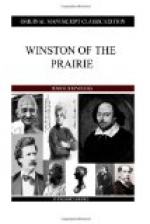Now, clad in well-worn jean trousers and an old deerskin jacket, he looked down at the bundle of documents on his knee, accounts unpaid, a banker’s intimation that no more checks would be honored, and a mortgage deed. They were not pleasant reading, and the man’s face clouded as he penciled notes on some of them, but there was no weakness or futile protest in it. Defeat was plain between the lines of all he read, but he was going on stubbornly until the struggle was ended, as others of his kind had done, there at the western limit of the furrows of the plow and in the great province farther east which is one of the world’s granaries. They went under and were forgotten, but they showed the way, and while their guerdon was usually six feet of prairie soil, the wheatfields, mills, and railroads came, for it is written plainly on the new Northwest that no man may live and labor for himself alone, and there are many who realizing it instinctively ask very little and freely give their best for the land that but indifferently shelters them.
Presently, however, there was a knocking at the door, and though this was most unusual Winston only quietly moved his head when a bitter blast came in, and a man wrapped in furs stood in the opening.
“I’ll put my horse in the stable while I’ve got my furs on. It’s a bitter night,” he said.
Winston nodded. “You know where the lantern is,” he said. “There’s some chop in the manger, and you needn’t spare the oats in the bin. At present prices it doesn’t pay to haul them in.”
The man closed the door silently, and it was ten minutes before he returned and, sloughing off his furs, dropped into a chair beside the stove. “I got supper at Broughton’s, and don’t want anything but shelter tonight,” he said. “Shake that pipe out, and try one of these instead.”
He laid a cigar case on the table, and though well worn it was of costly make with a good deal of silver about it, while Winston, who lighted one, knew that the cigars were good. He had no esteem for his visitor, but men are not censorious upon the prairie, and Western hospitality is always free.
“Where have you come from, Courthorne?” he said quietly.
The other man laughed a little. “The long trail,” he said. “The Dakotas, Colorado, Montana. Cleaned up one thousand dollars at Regent, and might have got more, but some folks down there seemed tired of me. The play was quite regular, but they have apparently been getting virtuous lately.”
“And now?” said Winston, with polite indifference.
Courthorne made a little gesture of deprecation.
“I’m back again with the rustlers.”




